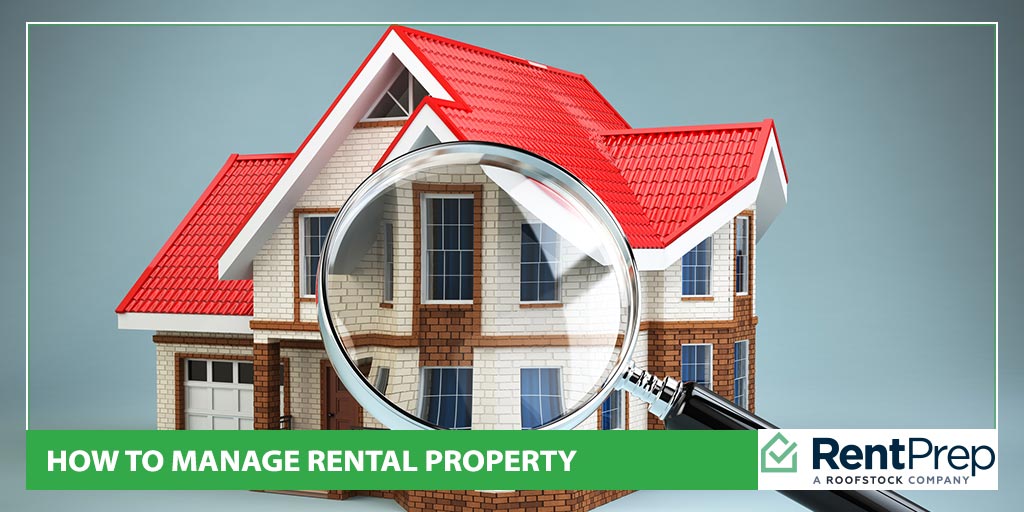
So you’re ready to take on managing rental property yourself. Rather than outsourcing every aspect, you’re prepared to learn how to manage rental properties.
Great! We’re here to help!
Contracts, maintenance, & late fees can be a bit overwhelming as a new property manager but don’t let these tasks scare you away from becoming a savvy property manager.
Choosing to control your business directly is a big one, but it’s also very rewarding.
From setting up basic forms that you can reuse again and again to getting help from third-party services when needed, we’ve got the advice you need to succeed.
Today’s guide will walk you through how to set the right rent prices, find tenants worth your time, and even what to do when you face an eviction situation.
A Table of Contents for Managing Rental Properties:
Before We Get Started
- Step 1: Buy & Repair
- Step 2: Set Prices & Expectations
- Step 3: Rent Your Property
- Step 4: Check & Maintain
- Step 5: Collect Rent
- Step 6: Evictions
- Step 7: Accounting
Before We Get Started

Let’s discuss something important before we get into the heart of this guide.
While these steps are laid out in a specific order, it is possible that you may have to deal with some of the steps non-sequentially. Depending on how many properties you manage or your property specifics, you may find yourself working on Step 7 before you reach Step 3.
That’s okay!
No guide, no matter how comprehensive, can give you an exact play-by-play of what you will have to do. Instead, use this guide as a general resource to help you work through different situations as they occur during your time as a property manager.
Step 1: Buy & Repair
The first step of managing any rental property is to buy the investment property and get it into good repair. If your property is not yet purchased or in rentable condition, these are the two things that you need to work on first.
Many factors go into buying the right investment property and repairing it to be profitable. Due to how many factors there are, this guide will not go into those details.
For more information about buying and repairing rental properties, check out these articles:
- 7 WAYS TO INCREASE THE VALUE OF YOUR RENTAL PROPERTY
- LANDLORD’S GUIDE TO FLOORING IN A RENTAL PROPERTY
Step 2: Set Prices & Expectations
Once you have control of your rental property and feel that it is ready to be rented out, you still have one more important step to complete before you can start looking for tenants. It’s time to set up your rental prices and expectations.
Market Research In Area
Before setting a price, you’ll want to research the average rental price in the area and the number of rental properties available. It’s possible that you already did some of this research during the buying process.
Figure out the following:
- What is the average income in the area?
- What is the average family size?
- What is the average rental price?
- Does your location have any extra-special benefits (i.e., bus line access, easy highway access, off-street parking) that you can charge more for?
As you take in the other rentals on the market and the going rates, you’ll be able to appropriately price your rental property.
List of Tenant Requirements
In addition to deciding on monthly rent, you also need to determine what requirements you have for a tenant looking to move into your property. By having the ideal tenant already in mind when you begin advertising your property, you’ll have a better chance of finding them.
Consider the following tenant characteristics, keeping in mind that it is illegal to discriminate against tenants:
- Minimum income
- Smoking or no smoking?
- Employment requirement
- Credit score minimum
- Past rental history required?
- Number of references required?
Step 3: Rent Your Property
Now it is the most exciting (and difficult) time of the rental process. It’s time to find new tenants to rent your property to!
Advertising
You will need to advertise your property. Advertise everywhere that you can; paying for additional exposure will be worth it. Try using common home sites like Zillow as well as area-specific publications such as a community magazine.
Finding Good Tenants

Finding any tenant isn’t enough; you want to find good tenants.
Good tenants respect your property, pay their rent on time, and do not cause unnecessary problems. It can be challenging to learn how to discern a good tenant during the interview process, but this skill will be instrumental.
Use a rental questionnaire to help you find out if each potential tenant is a good fit. Remember that you must follow strict rules about what you can and cannot ask about during these interviews. Asking about race, disabilities, and family size are basic no-nos. Following fair housing rules is a requirement.
To find a good tenant, be sure to do the following:
- Confirm their employment location & income
- Do a credit and background check
- Call their references
- Call their former landlords
- Have one-on-one, in-person conversations with them
Even if you do all of these things, you might miss something that indicates a bad tenant. Because screening tenants can be tricky, you may benefit from hiring a third-party tenant screening service to help you analyze all gathered information to find the best tenants.
Property Managers are also a great source for managing your properties, including screening potential tenants. Here’s what to look for in a property manager if you’re thinking about hiring:
Writing & Reviewing Rental Contracts
Once you have a tenant in mind, it will be time to sign the rental contract.
If you’ve never set up a rental contract before, you will want to gather some great examples from online to set up your own.
Alternatively, hiring a local lawyer to ensure you don’t miss any crucial details is a great idea for your first few contracts. From there, you can work on your own.
Be sure to include information about rental payment timing, eviction procedures, maintenance details, and home rules in the contract. Additionally, be sure to disclose and collect a security deposit when finalizing the agreement.
Review The Agreement
Before your new tenant signs on, you should go over the rental agreement with them. This will give you both chances to ask questions and clarify information in the contract to be sure that you each have a clear idea of what the agreement stands for.
The Walk-Through
Do a final walk-through either with the tenant or with a third-party objective observer.
Document as many details of the property as possible. These details can be used to prevent any disagreements later over damages, and doing the walkthrough with the client can help to prevent any future issues.
Step 4: Check & Maintain
Once your tenant is moved into the property, your role will become more passive, but that doesn’t mean that your responsibilities are over.
As a landlord, you are the tenant’s contact point. If they need help with the property or have an issue, you should be available to help them resolve the matter speedily and thoroughly.
Rental Visits
There are a few benefits to doing rental walkthroughs once or twice a year.
First, visiting your tenant at their property and checking in with them that everything is working well is an excellent way to keep the lines of communication open. There may be small issues popping up that they hadn’t yet reported to you; these walkthroughs are the perfect time to gain some more insight.
Second, doing a walkthrough will help you check out the state of the property. If your tenant knows that you will do bi-yearly walkthroughs, they may be less likely to cause any damages.
Regular Maintenance
All properties will need some maintenance. From simple plumbing repairs to light fixture replacement, you can expect your tenant to call you with issues that may pop up throughout their residency in your property.
To help maintenance happen more rapidly, prepare the following in advance:
- List of reliable local contractors
- Contact info for local landlords who may be able to help
- List of basic repair issues that you can fix yourself
- Specific maintenance fund
- Schedule regular check ups of appliances (AC units, water heaters, etc.)
Big Repairs
While every landlord hopes that it won’t happen, there is always the possibility that you will have to take on a big repair while you have your property rented out. From a large pipe burst to a storm causing extensive property damage, big repairs might have to happen.
If your property needs a significant repair that will force your tenant to relocate for a short period, it is your responsibility to provide them housing for any time that they have already paid.
You may also be required to help them pay for alternative accommodation in upcoming months depending on the situation.
In cases where extensive damage has been done to the property, you may want to talk to the tenant about finding somewhere else to live and ending your lease agreement early. It is possible to sign off on this kind of change.
Take a look at this recent interview with a property manager to learn more about what exactly goes into managing rental property:
Step 5: Collect Rent
As a landlord, one of your most prominent duties is to collect rent!
Every landlord has a different preferred method of rent collection. Some still get checks dropped off or mailed to them; others use electronic rent collection services that ensure they get paid on swiftly and on time.
There are pros and cons to each method, but ultimately, it’s up to you which type you decide. If you do choose to use an online processing method for rent collection, remember that there will be a fee involved, and you should work this fee into your rental price.
Raising Rent
Due to rising costs in the area, you may have to raise the rent. Raising the rent while you already have tenants in a property may seem impossible, but it may be necessary to do if they are long-term tenants who plan to stay for many years.
Disclose the possibility of a rent increase to your tenants and work with them to see if they will continue to stay in the property at the new rate or not.
Late Fees
Be sure to enforce a late fee for all late rental payments. If your tenant is regularly late with their rental payments, be sure that they are aware of the possibility of eviction should they continue to pay you late.
Tenants will come up with every excuse in the book for their late payments, and it’s okay to be sympathetic to their cause at one time or another. But when a tenant begins to serially pay their rent late, it’s a sign that they may no longer be able to afford your property.
Enforcing a clear policy about late fees will help to ensure that they do not continue to rent your property if they cannot afford it.
Your policy on late fees should be made clear in the rental agreement. When giving them notice of late payment fees, be sure to include the relevant section of the rental contract for their reference.
Step 6: Evictions
No landlord ever wants to end up in this position, but it is possible that you will have to go through an eviction on your properties at one point or another.
New landlords may have no idea what to do in this situation, so it is essential that you do some research about local laws to ensure that you are following all the rules.
It is vital that you file for eviction and go through the entire court process. Even if you are frustrated with the time that it takes to get a ruling and proper eviction proceeding, you must give notice to the tenant and file for eviction in the courts.
Any attempt to evict the tenant yourself (by changing the locks or some other personal action) can be considered a criminal offense.
Save yourself the trouble and instead follow these basic steps:
- Give them official notice, including how long they have to fix the problem that is breaking their lease agreement.
- File the eviction with the court if the notice terms are not met.
- Do not accept payment if you are filing for eviction, as it can nullify the eviction process.
- Read local laws to be sure you don’t break any rules.
- Hire a lawyer if the laws are confusing for you.
- Wait for the court ruling & local sheriff to perform the actual eviction.
Step 7: Accounting
Another aspect to property management that you may not be familiar with is the amount of taxes and other accounting information that you will be handling.
If you had a property management company, they would produce this information in reports for you, but doing it on your own can be more complicated.
To make your business accounting easier, follow these tips and tricks:
- Hire an accountant to do your taxes; the cost is worth it. They’ll help you maximize deductions and ensure a clean record.
- Keep a thorough record off all money spent on maintenance and other basic property upkeep; these are deductible.
- Set up specific bank accounts for your business expenses to ensure that your personal finances do not get mixed up in the business finances.
- Set aside money to cover taxes and other fees that may surprise you.
It’s Time To Be The Best Property Manager
You’ve decided to learn how to manage rental properties for yourself, and that is quite the achievement! Now that you know the basics of property management, the only way to become experienced at each step is to put this knowledge into action.
Remember that in its most minimalistic form, property management requires only a few simple steps:
- Buy and repair a property
- Set up a rental cost & tenant requirements
- Find tenants and rent the house to them
- Maintain the property
- Collect rent and pay taxes
- Profit!
Do not become overwhelmed at the thought of managing your properties. Being a landlord is rewarding work, and you can help improve your personal wealth by staying organized and alert throughout the process. To find out how to start your own property management business, check out this video:

